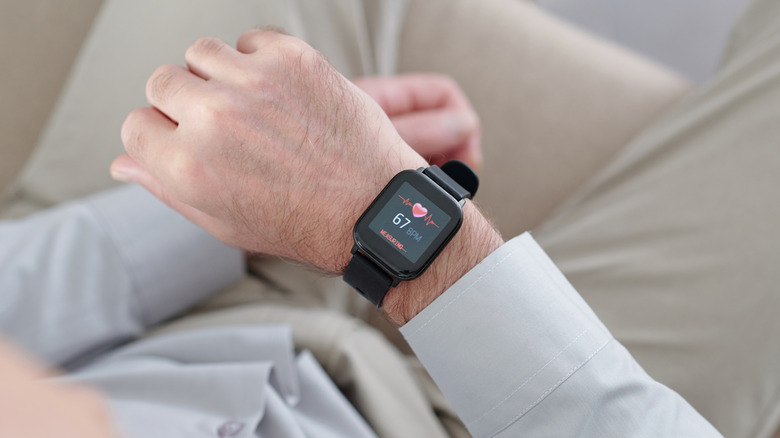Study Suggests Smartwatches May Pose A Risk To Those With Pacemakers
Staying in the know about the status of our health is all the rage these days, and tech companies are cashing in. Nearly 30% of people between the ages of 16 and 64 currently employ the use of a smartwatch or a wearable fitness tracker – a number that continues to rise with each passing year (per DataReportal). And while these devices can help users have a better understanding of their bodies by monitoring functions like sleep, calories burned, body composition, and heart rate, a new study suggests that these devices may be dangerous for people who require a pacemaker or implantable defibrillator.
Over 3 million people in the United States alone use a pacemaker – a lifesaving device implanted in the chest that helps to regulate the heartbeat in people with too slow or irregular heart patterns (per UpToDate). Pacemakers work by monitoring the heart rate and sending out electrical currents to the heart when it is beating too slowly. Another 300,000 Americans are equipped with an implantable cardioverter-defibrillator — a device that shocks the heart when it shows signs of irregular function.
In a new study published in Heart Rhythm, researchers revealed that the electrical currents transmitted by some smartwatches and other wearable fitness trackers can interfere with these heart-monitoring devices, potentially causing life-threatening malfunctions.
How smart watches interfere with implantable cardiac devices
Many fitness tracking devices — such as smartwatches, smart scales, and smart rings — use a technology called bioimpedance sensing which sends out a small electrical current to gauge body composition, stress levels, and vital signs (per Healthline). Researchers in the study examined how bioimpedance sensing affected the function of three implantable cardiac devices and found that the electrical currents sent out by wearable fitness-tracking gadgets have the ability to alter the function of these devices.
"While the electrical current applied to the body by the gadget is imperceptible by the patients, our work indicates it might be sufficient to confuse pacemakers, implantable cardiac defibrillators and cardiac resynchronization therapy devices," said study author, Benjamin Sanchez-Terrones, Ph.D., an assistant professor of electrical and computer engineering at the University of Utah (per U.S. News & World Report). Researchers also pointed out that the level of electrical interference put out by bioimpedance sensing exceeded the amount accepted by the U.S. Food and Drug Administration.
While Sanchez-Terrones stated that they were unable to determine an immediate risk to people who use implantable cardiac devices, he warns that devices that make use of bioimpedance sensing can incite pacing interruptions and may even elicit unnecessary shocks to the heart. Dr. Miguel Leal, chair of the American Heart Association's electrophysiology and arrhythmia committee, urges people with implantable cardiac devices to proceed with extreme caution and only use fitness tracking devices that have gone through extensive testing.


